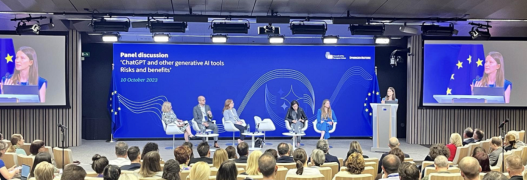
FOUR BENEFITS AND FOUR RISKS OF GENERATIVE AI, ACCORDING TO EXPERTS INVITED BY THE LIBRARY OF THE COUNCIL OF EUROPE
Five experts in the field of technology discussed the scope that generative Artificial Intelligence (AI) tools – such as ChatGPT – have and will have in the global society. It was an initiative of the European Council, carried out by the Library of that institution.
The experts highlighted five benefits and five risks to be taken into account, especially in the labor field, although not only in it.
The specialists who debated the subject are Virginia Dignum, Professor of Social and Ethical Artificial Intelligence at the University of Umeå in Sweden and associated with the Delft University of Technology in the Netherlands; Sandra Wachter, Professor of Technology and Regulation at the Oxford Internet Institute at the University of Oxford; Francesca Rossi, AI Ethics Global Leader and a distinguished research staff member at IBM Research AI; Martin Goodson, former Chair of the RSS Data Science and AI Section (2019-2022), organiser of the London Machine Learning Meetup and CEO of AI startup, Evolution AI, and Dieuwke Hupkes, research scientist at Facebook AI Research and involved with the Amsterdam unit of ELLIS.
The meeting was moderated by Stavroula Kousta, editor-in-chief of Nature Human Behaviour.
THE BENEFITS
Panelists highlighted, among others, these five benefits of AI, the European Council reported in a statement:
– The ability to perform a variety of language-based tasks that were not previously possible (such as summarizing large amounts of data).
– Having the ability to create complex text and images that can then be used to tackle difficult issues, such as climate change.
– What we can learn from neural networks (e.g., discovering patterns we haven’t seen before may become easier and they can also be very useful for routine, time-consuming tasks).
– Research can be more inclusive within the academic community and progress faster with open source LLMs (the more people working on it, the faster it will be to find possible solutions to problems).
THE RISKS
These technologies, based on what are known as Large Language Models (LLMs), also pose social risks. The speakers highlighted these five points:
– Increasing the speed at which disinformation and extreme views can spread.
– Disruption in society and displacement of administrative jobs in areas such as law, banking and engineering as the importance of education and people skills declines.
– New problems related to copyright infringement, privacy and plagiarism.
– Cost to the environment due to the energy consumption required to store and maintain massive amounts of data.
WHAT ABOUT THE APOCALYPSE?
The meeting emphasized that these real and present risks should continue to be debated and not apocalyptic ideas such as the one that superintelligent machines will take over society.
The major dilemmas posed by AI today have. Rather, they have to do with aspects such as discrimination, privacy, transparency, job security.
A CALL FOR REGULATION
One speaker, highlighted the European Council, called for AI to be built with seat belts and brakes and taking into account “driver’s licenses” and traffic rules, especially regarding the use and application of the technology.
For its development, instead, they spoke of the need for multidisciplinary, multi-stakeholder work. A work that involves the scientific research communities, as well as policy makers and companies. All of them were required for the safe development and use of AI tools.
Ideally, some speakers said, AI development should be open, globally shared, funded, if possible, with public funds for general benefit.
LIBRARY DOCUMENTS
The European Council Library has extensive documentation on the subject of AI, which can be reviewed online.
Interested parties can consult the LibGuides of the Council’s BiLibrary, at these links:
– ChatGPT and other generative AI tools.
– Library Guide on Artificial Intelligence (AI)



